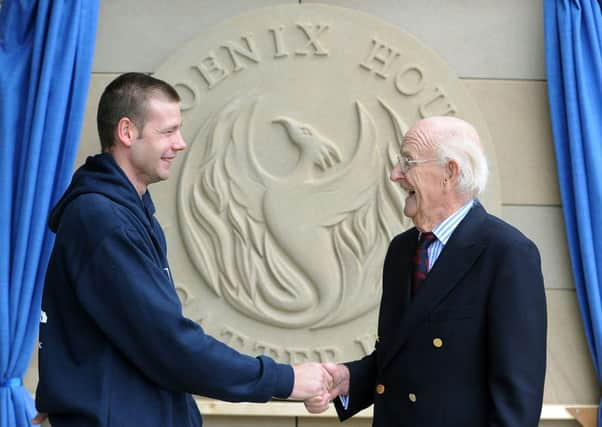Plea for mentors to help wounded join civvy street


A new scheme aims to recruit up to 300 mentors across the UK to support former soldiers, with North Yorkshire seen as a key area to focus on because of the high population of ex-servicemen. The region is home to Catterick Garrison, which is one of the Army’s largest bases and houses more than 13,000 personnel and family members.
The mentoring project is being run by forces charity SSAFA and is being funded with the help of money redirected by the Government from fines paid by banks involved in the Libor rate fixing scandal.
Advertisement
Hide AdAdvertisement
Hide AdPersonnel discharged from the army due to sickness or injury will be offered the additional support if it is thought their circumstances could result in a difficult transition into civilian life.
SSAFA said indicators to qualify for the scheme could include signs of mental health issues such as PTSD (post-traumatic stress disorder) or few roots in the civilian world to return to.
Karen Oldfield, SSAFA’s national manager of the scheme, said: “While many who leave the military are confident and successful, those who are injured or sick can find the return to civilian life daunting.
“Finding employment, housing and dealing with bureaucracy can be difficult for a few soldiers.
Advertisement
Hide AdAdvertisement
Hide Ad“This scheme will keep a watchful eye on those identified as facing potential difficulties and help see them through what can be a very difficult time.
“Leaving the Army, making the transition from military life, can be difficult. There are some things that are looked after for soldiers by the Army – a lot of life skills and everyday stuff are just not required.
“Most soldiers, the large majority, make a very successful transition but when you have an injury or illness things like accommodation and employment can be major challenges.
“Mentoring is about helping somebody to rebuild their life, building a resilience that’s perhaps been eroded and helping people realise they have a future – maybe not the one they envisaged but still one that has lots of potential.”
Advertisement
Hide AdAdvertisement
Hide AdThe scheme is being rolled out nationally after a successful 18-month pilot project, backed by charitable funding, which saw 49 mentors recruited across the country who supported 43 service personnel. SSAFA hopes to have 300 volunteers in place by the end of 2014.
Ms Oldfield, who has become a mentor herself, said North Yorkshire was an important area to recruit volunteers because of the military bases at both Catterick and York.
“A lot of people tend to resettle close to where they have served – that’s what we found during the pilot scheme. We had a lot of referrals from the Catterick Personal Recovery Unit.”
All would-be mentors undergo two and a half days of training, with most mentor and mentee relationships expected to last around a year.
Advertisement
Hide AdAdvertisement
Hide AdSSAFA said many come from a forces’ background but this is not essential and some military personnel actually prefer talking to a civilian.
Common sense, life experience and being able to listen are by far and away the most important attributes, the charity said.
Mentors are normally paired locally and expenses are paid.
The Government has provided £350,000 to fund the scheme nationwide and SSAFA is already preparing to secure longer-term funding to establish the mentoring scheme on a more permanent basis.
At any one time, around 2,000 people are in the process of leaving the armed forces. Injury or illness related to combat accounts for around one third of those medically discharged,
Advertisement
Hide AdAdvertisement
Hide AdThe scale of casualties in recent years has significantly increased the need for support for servicemen and women. There have been more than 10,000 admissions to British military field hospitals in Iraq and Afghanistan.
Two months ago, the specialist £10.7m Phoenix House facility was officially opened at Catterick. The support centre, which is the first of its kind for sick and injured veterans in the north of England, was built entirely with donations to the Help the Heroes charity. The Royal British Legion and other organisations will contribute to the running costs.
Anyone interested in taking part in the scheme can contact SSAFA through its website at ssafa.org.uk or by calling 0845 241 7141.